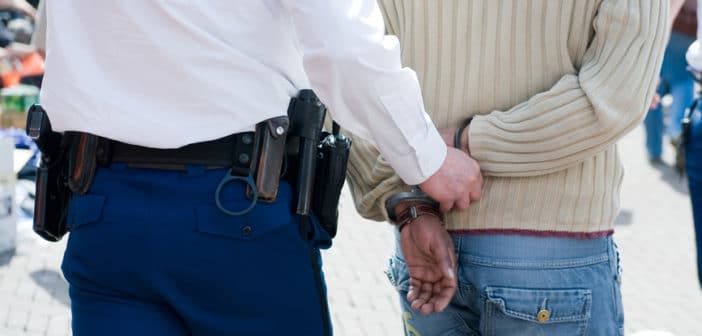 Though many celebrated the fact that, on October 1st, Oregon became the fourth state to enact the legal sale of marijuana to recreational users, it’s safe to assume that the FBI didn’t bring brownies to the party. In fact, according to the recent release of FBI data, 2014 saw an increase in marijuana arrests—despite weed being legal for recreational sale in Colorado, Hawaii, and Washington, with upcoming measures being passed in Washington DC and Alaska. This arrest rate shows the first uptick in arrests for pot possession since 2007, when the all-time high arrest rate of 775,137 was reached.
Though many celebrated the fact that, on October 1st, Oregon became the fourth state to enact the legal sale of marijuana to recreational users, it’s safe to assume that the FBI didn’t bring brownies to the party. In fact, according to the recent release of FBI data, 2014 saw an increase in marijuana arrests—despite weed being legal for recreational sale in Colorado, Hawaii, and Washington, with upcoming measures being passed in Washington DC and Alaska. This arrest rate shows the first uptick in arrests for pot possession since 2007, when the all-time high arrest rate of 775,137 was reached.
Big Money Spent on Pot Arrests
According to the new data, nearly 45% of the 1.5 million drug arrests made last year were on marijuana charges, and nearly 40% of those were just for possession. The government spends a lot to enforce marijuana possession laws—more than 3.6 billion dollars per year. Although consequences of arrest aren’t as fierce as they used to be, jail time can’t always be avoided. Those who are arrested can also end up stuck in a costly cycle of court dates and lawyers’ fees. Tom Angell, chairman of the drug policy reform group Marijuana Majority, points out that this 3.6 billion could be better spent improving the FBI’s arrest rate on more serious crimes. For example, more than a third of murders went unsolved last year. It might not be a bad idea to focus on that little issue.
No one’s saying that marijuana is the idyllic, consequence-free drug the hippies thought it was. Yes, it does some harmless stuff, like rendering its users overly reliant on patchouli and the Moosewood Cookbook. But it also negatively affects brain function in worrying and long-term ways. However, this arrest rate shows a federal focus on marijuana possession that is increasingly out of sync with public opinion. In fact, 2014 was the first year more than 50% of the American public felt that marijuana should be legalized.
Old School Cops Don’t Grasp New School Problems
In New York, however, the police commissioner has put his flat foot down on the idea of making further reforms on the city’s marijuana arrest policy. “We’ve made all the concessions we’re making regarding marijuana,” Commissioner Bill Bratton states.
This, despite the fact that K2, or synthetic marijuana, has turned East Harlem into what The New York Times recently described as a grotesque zombie zone, with ambulances regularly hauling away the drug’s twitching, vomiting victims. K2, also known as “spice” is readily available in convenience stores and is sold much cheaper than pot. Few arrests can be made in connection to the distribution of K2 because manufacturers frequently change combo of chemicals as substances are banned. The sellers of this synthetic poison easily stay one step ahead of authorities while users crave the cheap, all-day high despite nasty side effects like extreme paranoia, hallucinations, seizures and temporary paralysis.
Nonetheless, according to Bratton, marijuana is the issue. “When we have a shooting or a murder, almost invariably you’re going to find marijuana associated with that.” Interesting how he doesn’t mention booze, which is associated with 40% of all violent crime, despite being legal. Bratton, like much of the conservative law-enforcement world who wants to keep weed as a punching bag, thinks legalization is useless. He explains, “You can legalize every drug and I guarantee you they’ll find another illegal drug to use.” while grandly embracing arrogance and ignoring the facts.
On the Down Low
The lesson here—those regularly in possession of weed should not get cocky. They can still find themselves in a heap of trouble with only half an ounce. Even in the hacky-sacking state of Elysium known as Colorado, discretion is key. Some good news for those who want to stop smoking but can’t is that Uncle Sam’s spending coin on that, too. Which shows greater inventiveness than simply funding more possession arrests.
So, we’re in a waiting game. Legalization of pot is going to happen—it’s inevitable in an increasingly liberal America—whether law enforcement officials agree or not. Pot’s legalization will probably decrease the lure of dangers like K2, and allow us to get a clearer look at marijuana use when it’s separated from the complications associated with illegality. At that point perhaps the FBI will put its focus elsewhere and start working on its serious crime conviction rate. Because, unlike weed, no one digs the guy who brings an ounce of murder to the party.
Sponsored DISCLAIMER: This is a paid advertisement for California Behavioral Health, LLC, a CA licensed substance abuse treatment provider and not a service provided by The Fix. Calls to this number are answered by CBH, free and without obligation to the consumer. No one who answers the call receives a fee based upon the consumer’s choice to enter treatment. For additional info on other treatment providers and options visit www.samhsa.gov.




